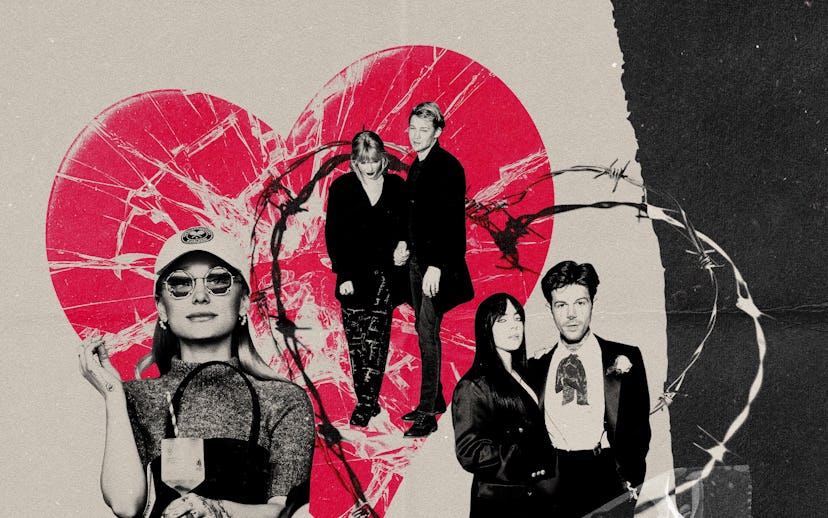
Culture
The Strange Comfort of Summer’s Mass “Breakup Season”
Unpacking the season of celebrity divorces, increased breakup dialogue, and heightened relationship anxiety.
Over the past few months, we’ve watched multiple celebrity couples go through public (and often dramatic) breakups. From Billie Eilish and Jesse Rutherford’s split in mid-May to Rosalía and Rauw Alejandro’s surprising separation in July (after announcing their engagement in March), it can feel like very few couples have escaped the current breakup season. Even Ariana Grande and Taylor Swift were caught up in breakup debacles online recently. With the word spreading that “everyone is breaking up this summer,” is mass breakup season just an anxiety-inducing illusion, or is something really in the air right now?
Beca Michie, a 20-year-old model in New York, joined those having a newly single summer this year after their boyfriend woke up on a random morning and said he needed to “find himself.” “Things had been rocky for a long time after my trust was broken,” they say. “Since then, I have felt a lot of peace.” Michie credits their breakup timing, and the celebrity divorce announcements, partially to coming out of pandemic lockdowns. “Many people found themselves settling into ‘comfortable’ relationships out of convenience and fear of being alone during such a hard time for everyone, so are now more eager than ever to explore their options,” they say. As people have pointed out online, there’s also the fact that Venus (the planet of love) is currently retrograde until September 3, and this particular astrological transit seems to be taking no prisoners.
Michie says that the majority of their friends left long-term relationships this summer, too, including marriages. “Almost like clockwork, my friends went through a breakup, attempted a new dynamic with their ex or tried getting back together, and then had to heal the second heartbreak that somehow was even more ruinous than the first time,” they say. Thankfully, this has brought them all closer. “I am happy we are all able to be there for each other, even if some nights that meant just letting the person cry and eat a 40-piece McNuggets.”
While going through a breakup at the same time as a friend can alleviate some (but not all) of the loneliness around a significant relationship ending, Todd Baratz, a certified sex therapist and relationship expert, says it’s almost impossible to tell whether breakups cluster, or if it's merely our perception. “It's clear that breakups constantly occur, much like the beginnings of new relationships or other significant life events, such as births or deaths,” he explains. Instead, Baratz says that the heightened awareness about breakups might stem from the increased discussion about relationship challenges in news outlets, among friends, and within families.
Baratz encourages people during discussions of it being the “summer of breakups” to remain grounded in the present and actively nurture our relationships instead of fretting over an unpredictable future. “Many people grapple with relationship anxieties but spend little time developing their relational skill sets,” he says. “Prioritizing the improving of our emotional and relational intelligence is more beneficial than attempting to control the future or someone else's actions.” This is particularly true for a current TikTok trend where people are pretending to lock their partners in the closet to take precautions for the breakups over summer.
Instead of fretting about if it really is breakup season, Baratz challenges us to view the rise of public divorces as an overall shift — one that’s not always negative. “The reality is that divorce rates are climbing and relationships do end,” he notes. “This mirrors a broader cultural shift where the longevity of a relationship is no longer the only benchmark for its success.” By assuming that all breakups are sad, unfortunate, or scary, we’re underscoring the lingering societal fantasy that relationships should last forever.
Paloma Clement-Picos, a 31-year-old culture journalist in Paris, found watching her favorite celebrities go through breakups during her own relationship ending to be cathartic. “Especially, as a Hispanic, Rosalia’s breakup felt closer to home in the sense that I look up so much to her. We’re from the same country and we are the same age,” she says. “Knowing that I’m going through the same thing as my favorite artist gives me comfort, even if I’m really sad for her because I’m thinking we’re having the same summer.” Clement-Picos says that calling this season the “summer of breakups” helps her process the end of her own relationship.
For those processing their summer heartbreaks well into fall and winter, Shilpa Cacho, a love coach in Dallas, is running an 8-day breakup retreat for women in Bali called Healing After Heartbreak. “I’ve noticed an uptick of women who are wanting an experience like this,” she says. “Many of us weren’t provided with the dictation on how to pick partners who align with our values, goals, and lifestyle, and — due to our conditioning, traumas, and family dynamics — most of us don’t get it right the first time around.” Cacho says the idea for the retreat was born out of her own experience with divorce at 31.
Although divorce is on the rise and the word “breakup” is on the tip of our tongues this season, it’s not exactly the summer of breakups — but perhaps the summer of facing the reality that relationships end, for better or for worse. Since there’s no denying that heartbreak is painful, if feeling like it’s all happening in clusters provides comfort, then so be it. This is the case for Genevieve, a 21-year-old student and harpist in Washington, DC, after five of her friends initiated breakups with their partners at different times between June and the end of July. “In my social circles, more of us are having conversations of ‘Is this even worth my time?’” she says. “Does that new Peggy Gou song have a reversed satanic chant telling us all to break up with our man? Maybe.”
This article was originally published on